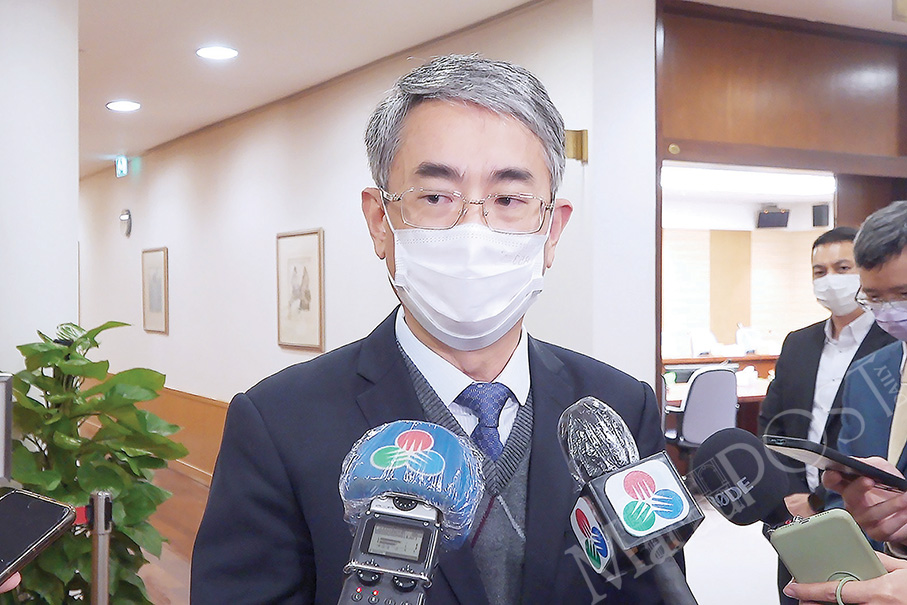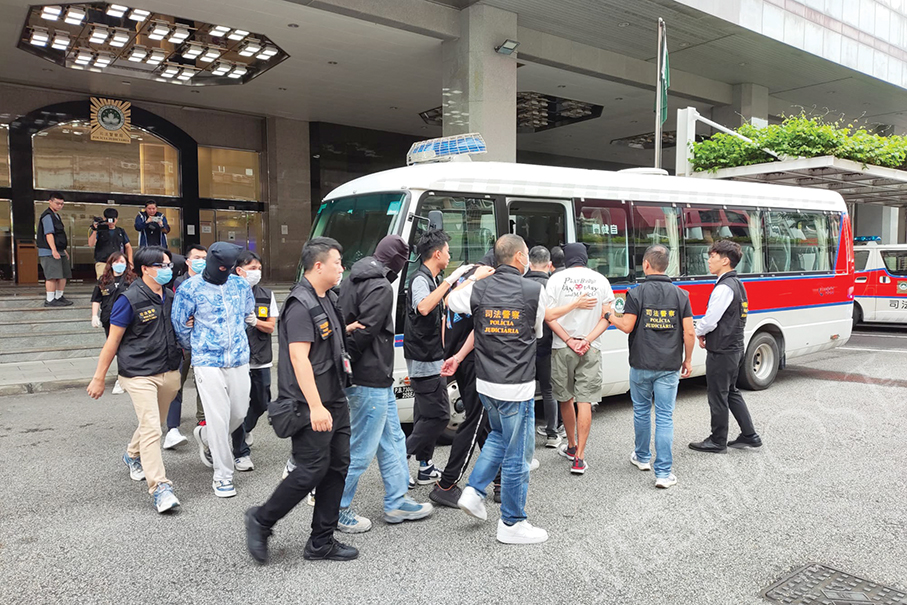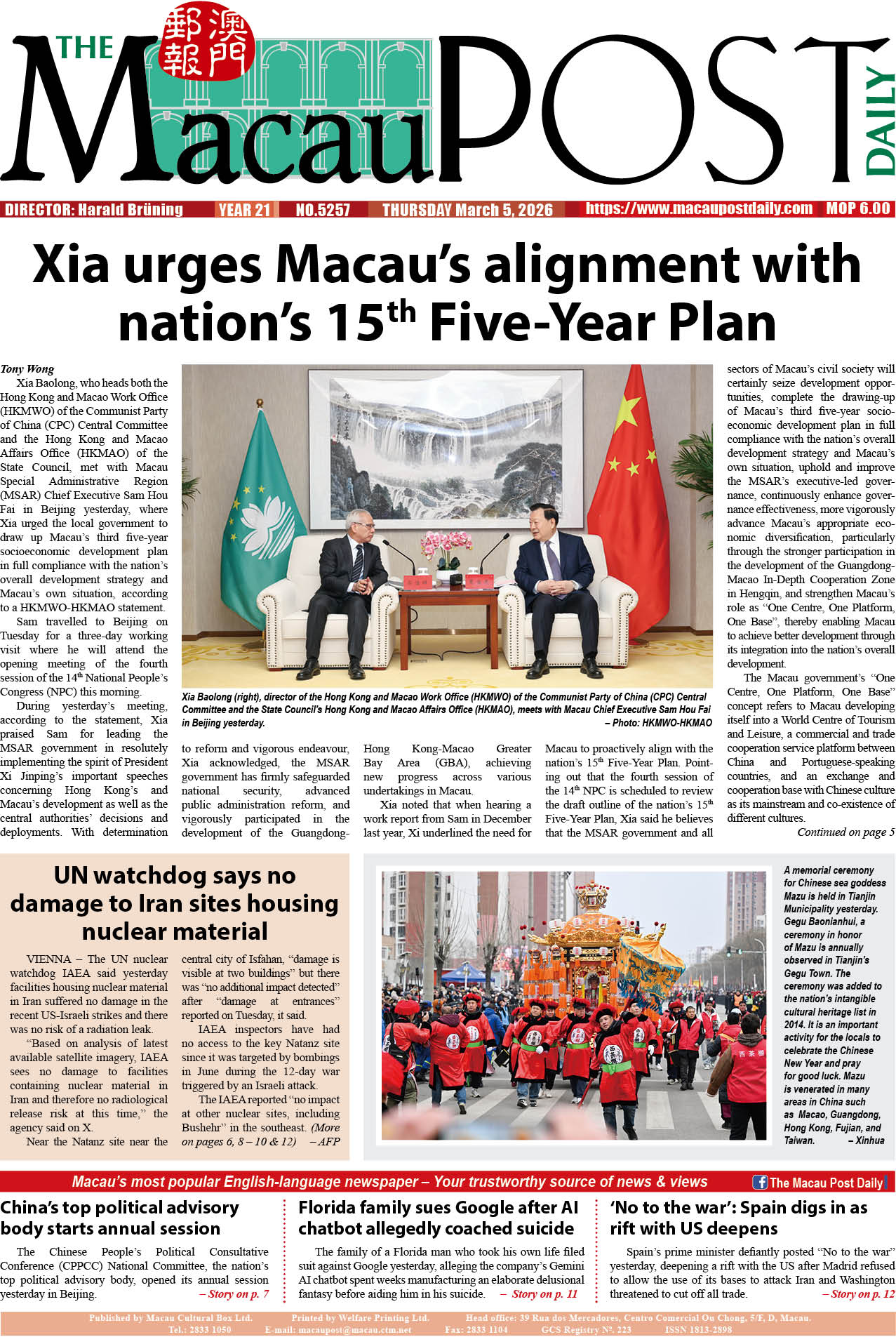Secretary for Administration and Justice André Cheong Weng Chon said yesterday that the government’s mandatory requirement for all those entering the city’s public service facilities and other public entities’ offices to use the Macau Health Code mobile app’s contact tracing function, which took effect on Monday, is “legally sound”.
Cheong made the remarks while speaking to reporters after attending a closed-door committee meeting in the Legislative Assembly (AL).
Those without a smartphone can present a printed version of their Macau Health Code, which will be scanned by staff members of the respective premises and facilities with a smartphone so as to record that they have visited there.
Cheong said yesterday that the government has received “good” feedback from residents on the new measure since it started on Monday. Cheong said that the Health Bureau (SSM) will consider extending the mandatory scan of contact-tracing-function QR codes to privately-run public premises and venues in the city after the mandatory use of the function at government premises and facilities has been smoothly implemented.
Cheong said that the Law on the Prevention, Control and Treatment of Infectious Diseases gives the government the power to implement the mandatory use of the Macau Health Code mobile app’s contact tracing function for those entering government premises and facilities. The policy secretary underlined that the government has concluded that “there is no problem” to make the use of the contact tracing function mandatory “in terms of the law”, after consulting its legal advisors.
Cheong said that the possible extension of the mandatory use of the contact tracing function to privately-run public premises and venues could also be legally supported. Cheong said that the government’s various measures to fight COVID-19 are not only based on the Law on the Prevention, Control and Treatment of Infectious Diseases, but also on various other laws and regulations concerning public health, such as the current by-law regulating the Health Bureau’s organisational structure and operation.
Cheong said that in the wake of the COVID-19 pandemic which started two years ago, the local government has been constantly reviewing the Law on the Prevention, Control and Treatment of Infectious Diseases, which was enacted in 2004 after the severe acute respiratory syndrome (SARS) outbreak in 2003. The current infectious disease law provides a “relatively perfect” legal system on the matter, Cheong said, adding that the government has concluded that for the time being there is no need to propose amendments to the law in the wake of the COVID-19 pandemic.
However, Cheong admitted that according to the current infectious disease law, it is only mandatory for those entering Macau to declare their state of health – i.e., by presenting their health code, and the mandatory requirement does not cover those who are entering certain premises and venues in the city. “Indeed there is no clear provision of such an requirement listed in the law,” Cheong said.
But Cheong insisted that for the time being there is no need to close the “loophole” by amending the infectious disease law, adding that more important is to roll out measures that ensure residents’ willingness to comply with the government’s COVID-19 measures, instead of amending the law with the aim of punishing those who fail to comply with the government’s COVID-19 prevention work.
For instance, Cheong said, the infectious disease law does not make it mandatory for residents to wear a facemask, but residents in general have been complying with the government’s requirement to wear a facemask when entering certain premises and venues.
500 public servants’ health codes become yellow
Meanwhile, Cheong also revealed yesterday that around 500 public servants have had their Macau Health Code colour turn yellow due to their recent visits to areas affected by COVID-19 in Zhuhai or Zhongshan. Cheong noted that they continue to work but are practising “self-health management” for a certain period of time. According to Cheong, those with a yellow health code who normally need to meet members of the public in their work are now working in a “back office” capacity, where they are also keeping a safe distance from their colleagues.
Cheong said that the around 500 public servants work for a number of public entities, because of which their temporary work arrangements do not adversely affect any public service provided to residents.
Cheong said that as the Municipal Affairs Bureau (IAM), which he oversees, is one of the public entities having the highest number of staff, the number of those with a yellow code working for the bureau is also higher than those working for other public entities.
21 COVID-19 cases in Zhuhai as of last night
As of last night, the adjacent city of Zhuhai had reported a total of 21 COVID-19 positive cases, including one asymptomatic case, during its current Omicron wave, which started last week.
One of the latest confirmed patients does not live in Nanping (南屏) town but in nearby Qianshan (前山) subdistrict. All other patients live in Nanping, which only lies a few kilometres northwest of Macau.
The validity of the negative nucleic acid test (NAT) result for those entering Macau from Zhuhai has been shortened to just 24 hours, which took effect on Sunday, in the wake of the current COVID-19 outbreak in the neighbouring city.
Meanwhile, Macau Government Tourism Office (MGTO) Director Maria Helena de Senna Fernandes told reporters after attending a closed-door committee meeting in the legislature yesterday that her office is continuing to organise its festive events which are slated to be held during the upcoming Chinese New Year (CNY) period, which will start on February 1, unless Zhuhai’s COVID-19 situation deteriorates, in which case, she said, her office would postpone the CNY events.

Secretary for Administration and Justice André Cheong Weng Chon talks to reporters in the Legislative Assembly (AL) yesterday. Photo: GCS








